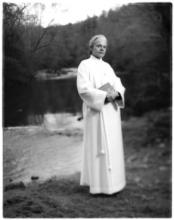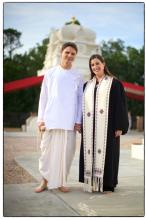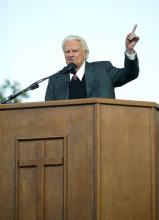duke divinity school

Caldwell was a “foot soldier” in King’s civil rights army, and he finally made it to Durham, where he closed out a social justice conference focused on a newer movement — the effort to secure full inclusion of LGBT people in the United Methodist Church.
“In some ways there is a possibility that on gay rights and marriage equality, God is speaking more through the judiciary than God is speaking through the United Methodist Church,” Caldwell said in his sermon at a gay-friendly United Methodist church just three miles away from the seminary he said denied him admission.

Turning part of the message over to church members is the concept behind a new worship model called WikiWorship.
Yes, that’s wiki as in Wikipedia.
The week before each WikiWorship, participants submit questions on religion, ethics, life, or God via the mission’s website. Then Chryst chooses one to spur discussion at each service.

With her gray hair tied neatly in a bun and her wire-rimmed glasses perched thoughtfully on her nose, Ellen Davis looks the part of a distinguished Bible scholar.
Her resume certainly reads like one – a Ph.D. from Yale University and teaching appointments at Union Theological Seminary, Virginia Theological Seminary, Yale, and now Duke Divinity School.
Yet despite the traditional cast, Davis is leading a quiet revolution. For the past 20 years, she has been at the vanguard of theologians studying the biblical understanding of care for the land.

Growing up Baptist, J. Dana Trent heard plenty of warnings about interfaith romance.
Marrying the wrong person — known as being “unequally yoked” — could ruin your faith and your marriage.
But three years after marrying a former Hindu monk, Trent says she’s a better Christian than ever.
“I had become complacent in my Christianity,” said Trent, an ordained Baptist minister. “Now my religion and spirituality have become much more integrated in my life.”

We gathered at Billy Graham’s alma mater over three days to explore his ministry’s place in American history and chronicle its meaning for the future. It was a fascinating conversation, and poignant, too, as Graham struggles with poor health at home in Montreat, N.C., far from the limelight he once commanded.
But as scholars and admirers here in suburban Chicago added to the growing conversation on Graham’s legacy, a question hovers: How many people younger than, say, 60 are listening?

Rest and renewal are hard to come by for any leader.
As such, there’s a week that I treasure each year for providing me with the deep replenishment I need to keep me going as I lead international creation care ministries. It may not be everyone’s idea of a good time, but for me it’s a balm that picks me up like no other—Duke Divinity School’s annual summer institute hosted by the Center for Reconciliation.
The first time I attended the institute in 2010, I limped in like a spent marathon runner crossing the finish line. After successfully rising to the challenges of the recently ended academic year, I was bone weary from the demands of leadership and ready for a week of recuperation and rejuvenation.
I was looking forward to being with like-minded leaders who implicitly understand my mission to educate Christian university students to “be agents of, and participants in, God’s shalom,” soaking in the wisdom from long time heroes like John Perkins, and participating in my selected creation care track led by Duke Divinity’s Norman Wirzba.
Smack dab in the middle of the Lord’s Prayer, obscured by old translations and otherworldly assumptions, is a radical cry for Jubilee justice
Wednesday morning I listened to a House Judiciary Committee hearing on "The Ethical Imperative for Reform of Our Immi